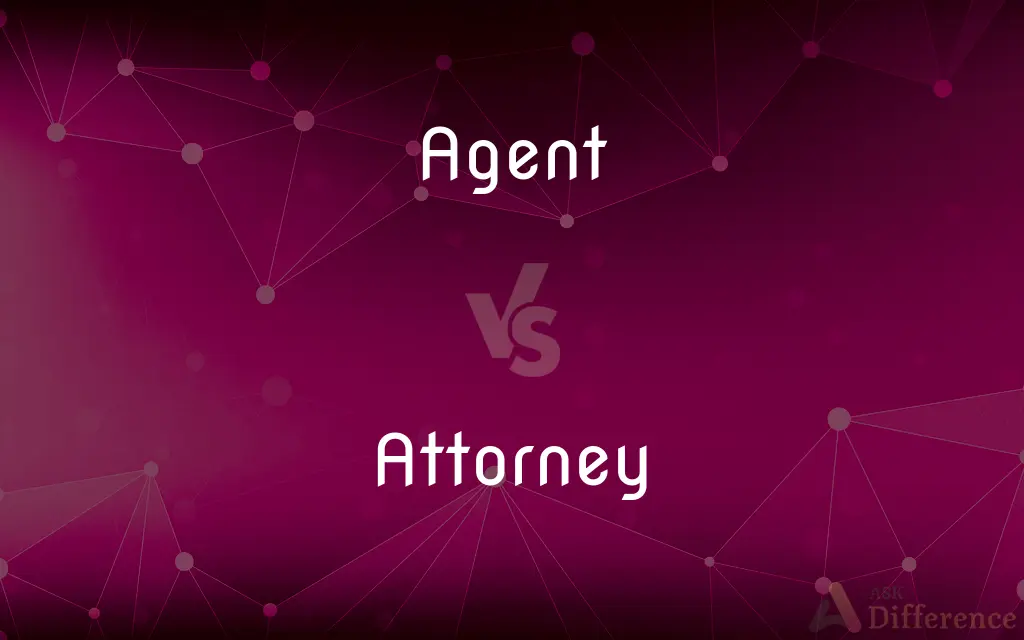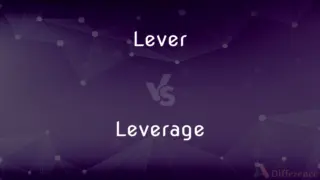Agent vs. Attorney — What's the Difference?
Edited by Tayyaba Rehman — By Maham Liaqat — Updated on March 5, 2024
An agent acts on behalf of another, handling tasks within a broad or limited scope, whereas an attorney, specifically a lawyer, provides legal representation and advice, often requiring legal qualifications.

Difference Between Agent and Attorney
Table of Contents
ADVERTISEMENT
Key Differences
An agent is someone authorized to act on behalf of another person or entity, known as the principal, in various transactions or negotiations. This relationship can be found in many contexts, such as real estate, entertainment, or business, where agents handle tasks ranging from contract negotiations to representing the principal's interests. On the other hand, an attorney, particularly in the context of an attorney-at-law in the United States, is a professional licensed to practice law, including giving legal advice, drafting legal documents, and representing clients in legal matters and court proceedings.
Agents operate under a defined set of activities or sectors, such as sports or literary agents, focusing on specific areas where they negotiate contracts or manage relationships on behalf of their clients. Whereas attorneys specialize in legal areas such as criminal law, family law, or corporate law, focusing on legal issues and ensuring their clients' compliance with the law and representation in legal disputes.
The relationship between an agent and their principal is governed by the principles of agency law, emphasizing trust, loyalty, and the agent's duty to act in the best interest of the principal. Conversely, the attorney-client relationship is bound by legal ethics, confidentiality, and the responsibility to provide competent legal representation.
Agents often work based on commission or fees for services rendered in their field of expertise, benefiting from successful transactions or negotiations. Attorneys, however, may work on various billing models, including hourly rates, retainers, or contingency fees, especially in litigation cases where fees may be contingent upon winning a case.
While agents can represent a wide array of interests and activities, not all require formal qualifications beyond industry-specific knowledge or certifications. In contrast, attorneys must obtain a legal education, pass a bar examination, and maintain their license to practice law through continuing legal education and adherence to professional standards.
ADVERTISEMENT
Comparison Chart
Role
Acts on behalf of another in various domains
Provides legal advice and representation
Specialization
May specialize in fields like real estate, sports
Specializes in legal areas like criminal law
Governing Laws
Agency law
Legal ethics and professional standards
Payment Model
Commission or fees for services
Hourly rates, retainers, contingency fees
Qualifications
Industry-specific knowledge or certifications
Legal education, bar examination
Compare with Definitions
Agent
A person authorized to act for another in selling or buying property.
The real estate agent found a buyer for the house within a week.
Attorney
A licensed professional who practices law.
The attorney provided legal advice regarding the contract.
Agent
A business or person that provides a particular service.
The insurance agent offered several policies to choose from.
Attorney
A legal representative in court.
The defense attorney argued the case brilliantly before the jury.
Agent
Someone who handles specific tasks for another.
The travel agent booked all the accommodations for the trip.
Attorney
A legal advisor in business or personal matters.
The company’s attorney advised on the merger deal.
Agent
A representative in entertainment or sports.
The actor’s agent secured a role in an upcoming blockbuster film.
Attorney
Someone who drafts legal documents.
The family attorney prepared the will and trust documents.
Agent
An individual who represents another in business transactions.
The literary agent negotiated a lucrative book deal for the author.
Attorney
A protector of clients' rights under the law.
The civil rights attorney took the case to ensure justice was served.
Agent
A person who acts on behalf of another person or group.
In the event of illness, a durable power of attorney enabled her nephew to act as her agent.
Attorney
A person who is legally qualified and licensed to represent a person in a legal matter, such as a transaction or lawsuit.
Agent
A person or thing that takes an active role or produces a specified effect.
Universities are usually liberal communities that often view themselves as agents of social change.
Attorney
One who is legally appointed by another to transact any business for him; an attorney in fact.
Agent
One that acts or has the power or authority to act.
Attorney
A professional person authorized to practice law; conducts lawsuits or gives legal advice
Agent
One empowered to act for or represent another.
An author's agent.
An insurance agent.
Agent
A representative who acts on behalf of other persons or organizations
Agent
Any agent or representative of a federal agency or bureau
Common Curiosities
What does an attorney do?
An attorney provides legal representation, advice, and prepares legal documents for clients in various legal matters.
Can an agent provide legal advice?
No, an agent cannot provide legal advice unless they are also a licensed attorney.
Do all agents require formal qualifications?
Not all agents require formal qualifications, but many have industry-specific knowledge, experience, or certifications.
What legal obligations do agents have?
Agents have a duty to act in the best interest of their principals, governed by agency law principles such as loyalty and trust.
What is the main role of an agent?
An agent acts on behalf of another person or entity to perform tasks or negotiate deals within specific sectors.
Can anyone be an agent?
While many can act as agents in various capacities, specific roles may require certain knowledge, skills, or certifications.
Are attorneys required to keep information confidential?
Yes, attorneys are bound by attorney-client privilege, requiring them to keep client information confidential.
How does one become an agent?
Becoming an agent typically involves gaining relevant industry experience, knowledge, and possibly obtaining specific certifications.
How does one become an attorney?
To become an attorney, one must obtain a legal education, pass a bar examination, and meet other licensure requirements.
How do agents and attorneys get paid?
Agents typically earn through commissions or fees for their services, while attorneys may charge hourly rates, retainers, or work on a contingency basis.
What kind of legal issues can attorneys handle?
Attorneys can handle a wide range of legal issues, including criminal, family, corporate law, and more.
Is an attorney the same as a lawyer?
Yes, in the United States, an attorney and a lawyer are terms used interchangeably to refer to a person who is licensed to practice law.
Can an attorney act as an agent?
Yes, an attorney can act as an agent, especially in legal transactions or when authorized to make decisions on behalf of a client.
What distinguishes an agent from an attorney?
The main distinction lies in their roles and qualifications: agents act on behalf of others in various sectors, while attorneys provide legal representation and advice.
Can agents represent clients in court?
Agents cannot represent clients in court unless they are also licensed attorneys.
Share Your Discovery

Previous Comparison
Lever vs. Leverage
Next Comparison
Brown vs. BrunetteAuthor Spotlight
Written by
Maham LiaqatEdited by
Tayyaba RehmanTayyaba Rehman is a distinguished writer, currently serving as a primary contributor to askdifference.com. As a researcher in semantics and etymology, Tayyaba's passion for the complexity of languages and their distinctions has found a perfect home on the platform. Tayyaba delves into the intricacies of language, distinguishing between commonly confused words and phrases, thereby providing clarity for readers worldwide.














































